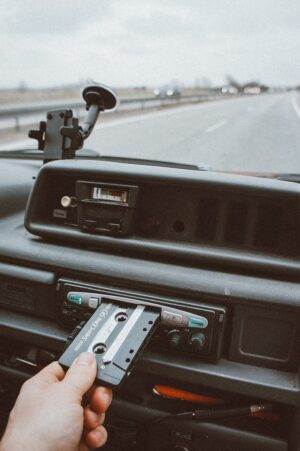You have no items in your cart. Want to get some nice things?
Go shopping
I hated when he asked me to put some music on. It was always in the car, and usually after he had turned off the radio in disgust. At the time, I did not understand why he listened to panel discussion shows that made him angry. He would growl his own answers at the audience questions and seemed to be pleased by nothing and by nobody. He didn’t fly into a rage, not really, it was more of a bad-tempered emotional churn. He would burble and sputter about tax cuts and the virtues of a small state for a while, and then – generally when the conversation turned to the subject of benefits claimants – switch it off and hand me the aux cable. Put some music on, will you. He always phrased it like that. The responsibility felt too heavy to carry and too unwieldy to manoeuvre. I would sooner have listened to the tyres gradually unspool themselves against the asphalt. Put some music on. Go on, put something on. Sometimes we would last two tracks, sometimes three. The hand that unhitched itself from the steering wheel and put us back into silence was inevitable.
Night presses against the windows and I am sweating in the heated passenger seat. I am 20 years old, still in the iPod era. There’s a loose thread at his breast pocket, he is my father. I am not yet a drunk and he is not yet a fascist, but we are both hurtling towards our conclusions. Resentment billows and balloons between us like some terrible wheezing creature. We are heading to the place we will both call home for five more years, though I will cling to it longer than he will. I shift in my seat. There’s a hot sour gob of shame in my throat and it does not matter how it got there. Somehow, when these elements are all in place – the car, him, me, the radio, and The Silence – it’s always there. He asks me to put some music on.
There’s an art to this. I skip over the Meat Loaf and Jeff Wayne’s Musical Version of The War of the Worlds, on the grounds that these choices are too obvious. He will surely twig that I am trying to please him, and this will displease him. Likewise, the Dire Straits and the Thin Lizzy. I settle on some inoffensive jangle-pop tune from the early-aughts, which buys me exactly three minutes and twenty-two seconds to decide what comes next. I skip over the Bon Jovi (see above). I skip over the Queen. I toy with the idea of putting on Rage Against the Machine in a kind of covert/overt protest against his conservatism, but decide against it. A hand rises from the steering wheel like a body animated by spirits. It drifts over to the car’s central console and settles not on the power button but on the volume dial. Slowly, the guitars and drums fade into nothing. My father gets to the aspirate of “did you hear that?” and no further.
I am 16 years old and I have learned where my heart and guts are. My science teacher has taken my iPod and plugged it into a set of speakers and hit shuffle. We make it through Givin’ Up by The Darkness, Spies by Coldplay, and twelve seconds of an episode of Radio 4’s The Today Programme before one of my classmates yanks out the cord and wordlessly hands me the device back.
When the rear driver-side tyre exploded, I thought we had hit something muscular.
An old love gave me an illegal download of Salt Marie Celeste by Nurse with Wound. It gave me sleep paralysis.
My father steers into the skid. I am braced against the footwell with legs straight and locked. The handle above the door cuts into my palm, and I have no recollection of reaching for it. We are yanked sideways as though by a tractor beam or by a giant fishing hook. I feel the car nudge itself across the lane markers, feel its momentum fight against the grip of the remaining three tyres. My seat compresses, I wish it were unyielding. I feel my face stretch into a hideous gurn. Still we move. We are compelled.
I hate the sound of circular saws against metal. The tool seems to take a short inhale, then bursts into a long and descending wail as its teeth cut through the steel or aluminium or whatever it is. The sound is not a cry or a scream but an awful, inconsolable weeping. The first time my metalworking teacher used one in class, I held back tears of my own. It seemed somehow indecent to listen to a machine designed for violence howl with grief.
Chevrons shoot past us like comets. We are not stopping. We are not. Outside it is black and grey and orange. We are going to die; anything else is inconceivable. My father turns the wheel until his arms are knotted one across the other. The uppers of my shoes are coming unglued from the soles. My shirt is a polyester blend and itches and does not fit. Dully, I hope that they dress me in something nicer for the funeral. I let go of the handle above the door and I do not know what to do with my hands. I do not know where we are. We are somewhere along a ribbon of anonymous motorway somewhere. I do not drive – have never driven a car – but I am stamping an imaginary brake pedal in the passenger side footwell. I am at the wrong end of a big overdraft, and the relief I feel at no longer having to tend to it is obscene.
It is widely acknowledged that the 1961 case of Betty and Barney Hill is the origin for our culture’s myths about alien abduction. Their story contains all the tropes with which we are now familiar. A lonely night-time drive interrupted by lights in the sky. Lost time and memories. And afterwards, nightmares about being taken aboard a spaceship and undergoing medical procedures without consent. Later, under hypnosis, Barney screamed and wept.
We reach the hard shoulder and the car grinds itself to running pace, walking pace, crawl. I fumble open the door and try to vomit, but I have nothing. I feel as though I have been poorly assembled from spare parts. My father says nothing. At some infinitely low level, too low for human ears to pick up, a song continues to play through the car’s speakers. For a moment, in silence, we just sit, alone and in the dark, a single malfunctioning satellite on the edge of a deep gravity well. Ahead, and just visible in the headlights, are the remains of a badger – buckled and lifeless, the front half tattooed into the road. I look at the clock on the dashboard. It has not moved a single digit.
I listened to the Betty and Barney Hill Hypnosis Tapes through crackling earphones on a school computer and could not sleep for three nights. I did not see faces at my window, but more than once I sensed one grey eye pressed up against the glass, enormous and wet and disinterested. After the first night, I held my curtains shut with elastic bands. The tapping could be easily explained by the overgrown clematis that covered the side of the house. The terrible scraping, as though one giant finger were brushing up and down the bricks, at 3:37am, every night for three nights, could not be.
My father shepherds us into a petrol station. He knows how to jack up the car and he knows how to ease the ruined tyre away from the four giant screws that fasten it onto the axle. He cradles it in both arms for a moment, then stumps off to the boot to get the spare. It is as though he had been waiting for this to happen and had assembled all the tools for just such an occasion. It is as though this was all one giant test of character, and at any moment someone is going to appear and say yes and you’ve passed and you’ve done so well and we’re all so very proud of you. I look at my father’s back as he tightens the bolts on the spare tyre, and I wish I knew what I wanted to say. The neon of the Welcome Break sign does not thrum anew with possibility. Under the lights, the forecourt gravel does not resemble diamonds.
About Christopher R. Moore
Christopher R. Moore is a socialist writer based in Leeds. He makes lino prints of sea creatures and writes songs about ghosts. He is a long-distance runner and has a single-handed backhand. He interviews zealots and has won the Canterbury Christchurch International Poetry Prize. He has strong views on the present continuous.



